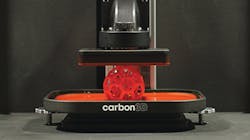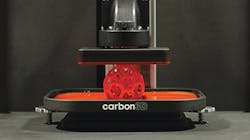3-D system uses photochemical process to break new ground
A new printer that uses light to cure resins can produce parts that rival injection molded products in quality, says its manufacturer.
Carbon 3D Inc., Redwood City, Calif., debuted its first commercial 3-D printer with a definite technological twist. Carbon 3D said that for the first time, it's possible to print isotropic parts with the mechanical properties, resolution and surface finish of injection molded parts.
"We identified a problem where there is no single 3-D printer that offers high resolution, high accuracy, good mechanical properties, a wide spectrum of mechanical properties," said Jason Rolland, VP of materials with Carbon. "Until this point, I think 3-D printing has been really, really limited. We looked at this problem and said, there is a real opportunity here."
The M1, which officially launched in April, uses a photochemical process called CLIP, or continuous liquid interface production, that enables layerless, continuous printing. The new rapid production process uses oxygen inhibition in conjunction with UV polymerization to make parts. Once the part is produced, it is baked in a forced-circulation oven. Thermal curing sets off a secondary chemical reaction that strengthens the chemical bonds and hardens the materials. The build envelope on the machine is about 5.7 inches by 3.2 inches by 13 inches.
Print speed is dependent on the geometry of the part being produced and the resin, said Rolland, a polymer scientist. However, Carbon officials said the M1 can print 10 to 100 times faster than traditional stereolithographic units. Carbon has three patents on the CLIP process and as many as 60 others are pending on related parts, materials and processes.
Carbon is vertically integrated in producing the printer, the software and the materials. It is introducing a family of seven proprietary resins. They include rigid PU (RPU), a semi-rigid flexible PU (FPU), a cyanate-ester-based resin (CE) and PR, a prototyping resin.
As it developed the machine, the company deliberately worked with companies that were early adopters of 3-D technology, Rolland said.
It is selling the machine on a subscription-pricing model. The subscription is priced at $40,000 per year for the first three years. This price includes a hands-on service team.
"We looked at the subscription model as a way of future-proofing our customers," said Rolland, explaining that the arrangement will give customers access to the newest machine innovations. "This will allow them to stay evergreen."
Customers will be able to take advantage of continuous upgrades. When data is updated, customers' machines will be updated, too. Officials said the M1 is Internet-connected and data rich. The machine collects over 1 million process control data points per day. This allows Carbon to provide very precise remote diagnostics, assist with print optimization and improve part quality over time.
Angie DeRosa, managing editor
Contact:
Carbon 3D Inc., 650-285-6307, www.carbon3d.com

